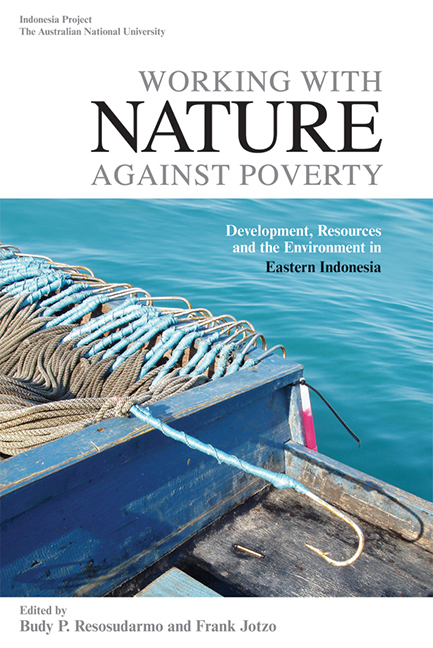Book contents
- Frontmatter
- Foreword
- Contents
- Figures and Maps
- Tables
- Contributors
- Acknowledgments
- Glossary
- Map
- 1 Development, Resources and Environment in Eastern Indonesia
- PART I ECONOMIC DEVELOPMENT AND POVERTY ALLEVIATION
- PART II NATURAL RESOURCES AND THE ENVIRONMENT
- PART III CONFLICT, LOCAL DEVELOPMENT AND HEALTH
- 12 Maluku: The Long Road to Recovery
- 13 Improving the Livelihoods of the Poor: Challenges and Lessons from East Nusa Tenggara
- 14 How Far Is Papua from Achieving the Goals of Healthy Indonesia 2010?
- Index
13 - Improving the Livelihoods of the Poor: Challenges and Lessons from East Nusa Tenggara
from PART III - CONFLICT, LOCAL DEVELOPMENT AND HEALTH
Published online by Cambridge University Press: 21 October 2015
- Frontmatter
- Foreword
- Contents
- Figures and Maps
- Tables
- Contributors
- Acknowledgments
- Glossary
- Map
- 1 Development, Resources and Environment in Eastern Indonesia
- PART I ECONOMIC DEVELOPMENT AND POVERTY ALLEVIATION
- PART II NATURAL RESOURCES AND THE ENVIRONMENT
- PART III CONFLICT, LOCAL DEVELOPMENT AND HEALTH
- 12 Maluku: The Long Road to Recovery
- 13 Improving the Livelihoods of the Poor: Challenges and Lessons from East Nusa Tenggara
- 14 How Far Is Papua from Achieving the Goals of Healthy Indonesia 2010?
- Index
Summary
INTRODUCTION
Developing a livelihood development policy that effectively alleviates poverty while protecting the environment has been the focus of much study and debate in developing countries for several decades. This issue is highly relevant for Indonesia, where problems of poverty, unemployment and environmental degradation remain pervasive. In 2003, around 16 million Indonesians, or 7.5 per cent of the population, were living on less than US$1 per day, the poverty line set by the World Bank (Kerstan et al. 2004; Kompas, 1 November 2004). But the number of Indonesians vulnerable to poverty, that is, living on less than US$2 per day, was far higher, at more than 110 million people, or around 53 per cent of the population (Kerstan et al. 2004). In the 2004 Human Development Report, Indonesia was ranked 111th out of 177 countries on the human development index (HDI), a widely used measure of the health, education and standard of living of a country's population (UNDP 2004: 141).
Since the mid-1990s, a number of livelihood development programs have been implemented in eastern Indonesia to alleviate poverty. They include the government livelihood development program for ‘left-behind’ villages (IDT), the World Bank-funded Sub-district Development Project (PPK) and the Poverty Alleviation and Support for Local Governance Program (PROMIS) implemented by the German government-sponsored agency, GTZ. This chapter assesses the performance and effects of PROMIS in East Nusa Tenggara to extract lessons for future livelihood development programs. Particular attention is paid to the impact of this program on poverty and the environment.
The next section of the chapter provides a brief overview of the local context in East Nusa Tenggara, and of the province's development policies. It is followed by a section describing the concept behind PROMIS and examining the strategic instruments applied in East Nusa Tenggara. The fourth section discusses the effects of the program on local livelihoods from the perspective of the local economy, the social setting and the environment. The last section contains the authors' conclusions.
- Type
- Chapter
- Information
- Working with Nature against PovertyDevelopment, Resources and the Environment in Eastern Indonesia, pp. 305 - 320Publisher: ISEAS–Yusof Ishak InstitutePrint publication year: 2009



